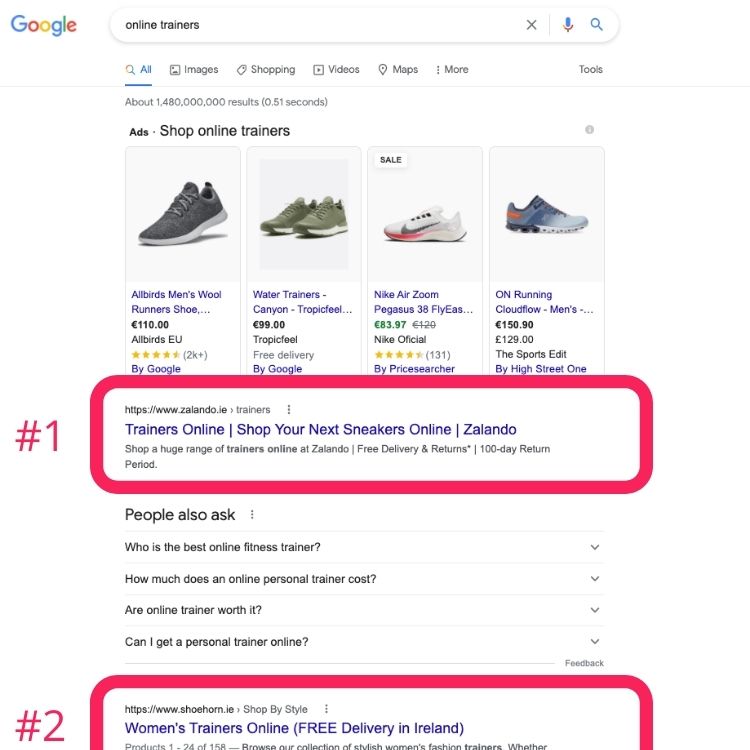Search Engine Optimisation (SEO) is the process of improving your websites traffic and ranking on search engine results pages such as Google and Bing. It revolves around creating high-quality content that people are interested in and answer queries on Google in addition to constant monitoring of your websites technical health. In the image below, you can see where websites with good SEO end up on the Google results page. #1 is where you need to be.
Why is SEO Important?
- More traffic and ultimately sales. If you tick all your SEO boxes, quite simply, you’ll rank higher and get more traffic which in turn means more leads and sales.
- Credibility and trust. Establishing trust with your prospects, leads and ultimately customers is important to move people along their online purchasing funnel. Optimised on page elements and content that answers user queries is one example of how good websites achieve this and Google loves it. The highest ranked websites on Google are those with high authority in their areas of expertise.
- Better customer experience. When users land on your website that has a simple interface, easy to navigate and don’t get bombarded with pop ups, banners and carousals, this leads to a better experience that in turn increases conversion rates and sales. Think of it as organising your physical store, where your products are organised in their respective shelves, customers can easily navigate through the isle’s and at all times know where the checkout is as well as the shop assistants. Well, building your websites should be treated the same way and thats done through good UX and website design.
- Nearly 92% of organic clicks on Google come from results on the first page. So, if you’re website ranks outside of page 1, don’t expect a lot of traffic. Thats why its imperative to improve your SEO so you’re always in those top spots on Google.
- SEO can be cost effective vs other acquisition channels. Yes it can take a lot of time in creating the rich content needed to rank higher, but in the grand scheme of things and over a longer investment horizon, it is probably the most cost effective way of getting traffic and customers. Furthermore, SEO can hold value for many years into the future.
- SEO is PR. Simply put, if you’re constantly at the top of Google results, you’re building up a strong brand equity and profile.

How does SEO Work?
SEO is the process of trying to persuade search engines like Google to recommend your website and content to their users as the best solution to their problem or need.
In order for Google to collect information on websites, search engine bots “crawl” websites to create an index of all that content. They then move from page to page and website to website using links between them. So for example, if your website has a link to another external website, the bot will get to that other website from your link, and then begin to crawl the content on that site and so on the process goes.
Once the bots get this information, an index is created. Search engine algorithms then review the index based on hundreds of ranking factors to determine which pages should appear where on the search engine results pages (SERPs) when users type in a specific query.
Keep in mind that this isn’t a “set it and forget it” type of process — search engine optimisation, after all, focuses heavily on optimising pages. This means keeping your content up to date, adding information to target relevant keywords, gaining relevant backlinks to your site, and much more.
3 Pillars of SEO
- Technical SEO: Includes indexation, crawling, site speed, website architecture, structured markup, and more to ensure your website is set up in a way that is accessible to search engines.
- On-Page SEO: Includes content, images, title tags, meta descriptions, internal links, and essentially anything on the actual web page.
- Off-Page SEO: Includes actions taken outside of your own website to influence rankings, including building backlinks from other websites, implementing a social media strategy, engaging in influencer marketing, gaining authority, PR and more.
How Search Engines like Google Work
The main goal of search engines is to satisfy their users with useful, relevant information. They want to provide the best results when a user searches for something. When someone uses a search engine, such as Google, Bing, or Yahoo, they are looking for the solution to a problem or the answer to a question. These engines want to provide the most helpful, relevant, and credible answer or solution.
Keywords or Search Terms
This is the process of understanding what your target market are searching for on Google. There are many tools out there that can help you find this out. Once you have a list of relevant search terms or keywords, then its all about creating content and building pages on your website that answer the queries in these search terms. Its critical to understand your niche and create content relevant for them, rather than casting a wide net and not ranking well in one area or subject matter.
Conclusion
There’s a whole lot more to SEO that we could talk about but we’d be here for days. I hope this article gives you the top level info you need to understand it a little better going forward. As mentioned above, SEO is a long term investment. Where Google Ads can provide instant traffic and sales, its comes at a heavy cost that needs to be managed carefully to ensure ROI. SEO on the other hand and competitive organic rankings can be achieved using certain techniques and ensuring best practices are followed. Furthermore, its a long term investment that can see you deliver strong ROI well into the future.
Need help sorting your SEO for your business or would like to kick start your SEO efforts, feel free to reach out to us. We’re happy to advise on the best strategy and plan tailored to your business size and needs.
Let’s Work Together
TELL ME MORE ABOUT YOUR PROJECT
If you’re interested in any of the services mentioned above, please feel free to get in touch. We offer a wide range of services and can be flexible per client. Just give us your name, email or phone number, a little about what it is you need help with and we’ll be in touch. Fill in the form below or email info@thatsitmedia.com. Speak soon!
